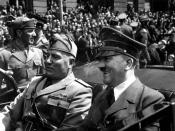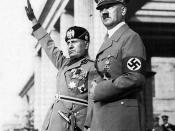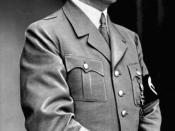This question is one which has high importance. This is because it helps us to determine whether Hitler's economic policies were made in the true interest of the welfare of the nation, or were made to protect his position as fuhrer and prepare Nazi Germany for war which he deemed was inevitable.
In 1933 Nazi Germany faced not only a political crisis, but also a serious economic one. The world depression had hit Germany particularly badly, and unless Hitler's regime confronted the economic crisis effectively, it was unlikely to survive in the longer term. Unemployment was possibly the biggest problem that Hitler could attempt to resolve. In 1931 levels reached a staggering 8.5 million people without work. In 1933 Hitler decided to extend previous work schemes as used by Schleicher. These created many jobs, and so helped Hitler reduce unemployment. Huge amount of state funds, 5 million RM (Reichsmark) in fact were flooded into the creation of even more schemes.
Unemployment in Germany dropped due to a number of issues. The number of women in the workforce dropped as Hitler wanted each family to have many children. The Nazis also forced people to work. Many public works programs began; the most significant was the plan to construct over three thousand kilometres of four-lane highways, called autobahns, linking the country from east to west. Another factor that reduced employment was the creation of the German Labour Service in 1935. All males over the age of 18 were required to do six months of labour service.
Almost as soon as the Nazis came to power, Germany began to rearm. In October 1934 Hitler authorised an increase in the size of the German Army, and in two months it had grown to 280 000 soldiers. In March 1935 he announced the reintroduction of...



Nazi Germany
Of course I believe that the economic measures were put into place to prepare Germany for war. Hitler always yearned for total control. Remember the Germans had the strong militarist beliefs of the Prussians for more than a century. War and force were their main initiatives. War and fierce industrialisation were their ways of gaining territory and also of defending Blut und Boden (Blood and Soil).
The above was just my two cents but overall, your essay contained a lot of information. It was both enjoyable and understandable. Very very good!
2 out of 2 people found this comment useful.